Covid: Can the arts lead the green recovery from the pandemic?
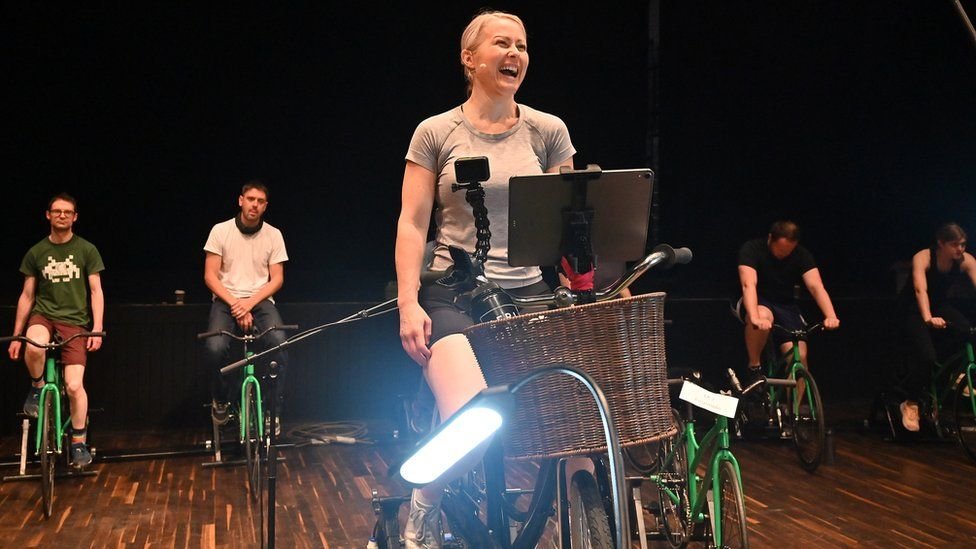
Written by James FitzGerald, and published originally by BBC Minute, July 10, 2021.
As the arts and culture sector attempts to recover from the devastating impact of the pandemic, some creatives are making eye-catching attempts to prevent another crisis - this one environmental.
The likes of artists and musicians certainly have the power to influence others' behaviour. And some of them are finding that climate action is actually making their work more marketable too.
But other organisations face an uncertain future due to Covid - with some struggling to return to business at all.
- The climate change clues hidden in art history
- Poorer nations 'more focused on sustainability
- Climate change destroying ancient cave paintings
In June 2020, hundreds of creatives signed an open letter calling for a green recovery from Covid. It was organised by Julie's Bicycle (JB), a non-profit organisation working on sustainability in the creative industries. Founder Alison Tickell believes momentum has been building over the last year.
"Many people working in culture have been forced to take a time out of the day-to-day and reflect on the big stuff," she says. "And there is no bigger stuff than the environmental crisis."
Festival waste in the spotlight
Nearly five million people camp at UK music festivals each year, producing nearly 26,000 tonnes of waste, according to the 2020 Show Must Go On report.
Wide Awake is a new one-day festival that will debut in south London's Brockwell Park in September with a climate-conscious "positive policy". This includes promises to use biofuel and eco-toilets, to bury no waste in landfill, and a ban on single-use plastics, an idea adopted by similar festivals.
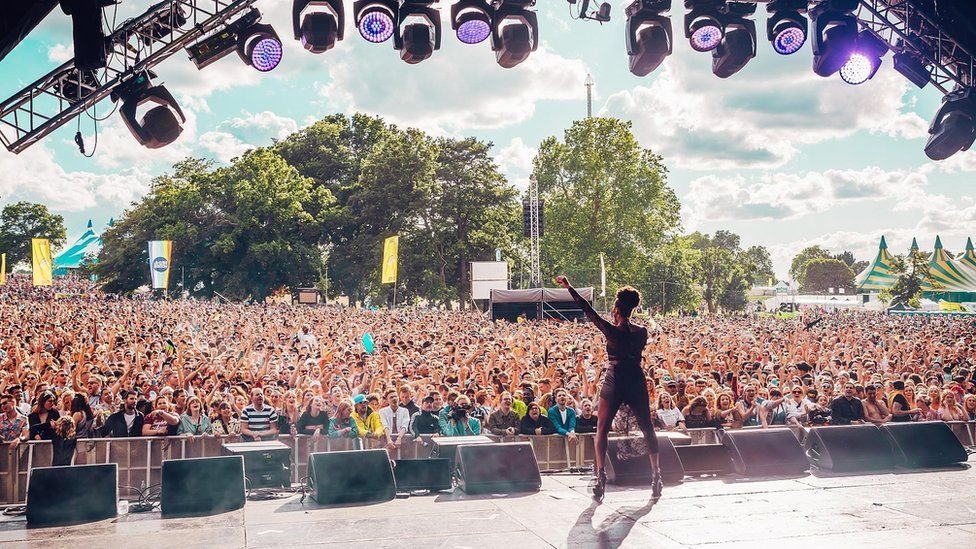
"We've created a template," says director Marcus Weedon. "Ideally it's something that other festivals and local authorities would start using in time." His other events in the park - Mighty Hoopla and Cross the Tracks - will be governed by the same policies.
The team will report back afterwards to identify any areas for improvement. "We want to be very open," adds Jeff Boardman, who works on the projects' sustainability.
"We haven't got the answers on everything. But we're certain that we can find them with other people."
Galleries reconnecting with nature
Globally the visual arts - including galleries and their visitors - account for some 70 million tonnes of carbon dioxide equivalent per year, according to an estimate by Julie's Bicycle. But many UK galleries and museums are promoting environmental messages as they emerge from Covid.
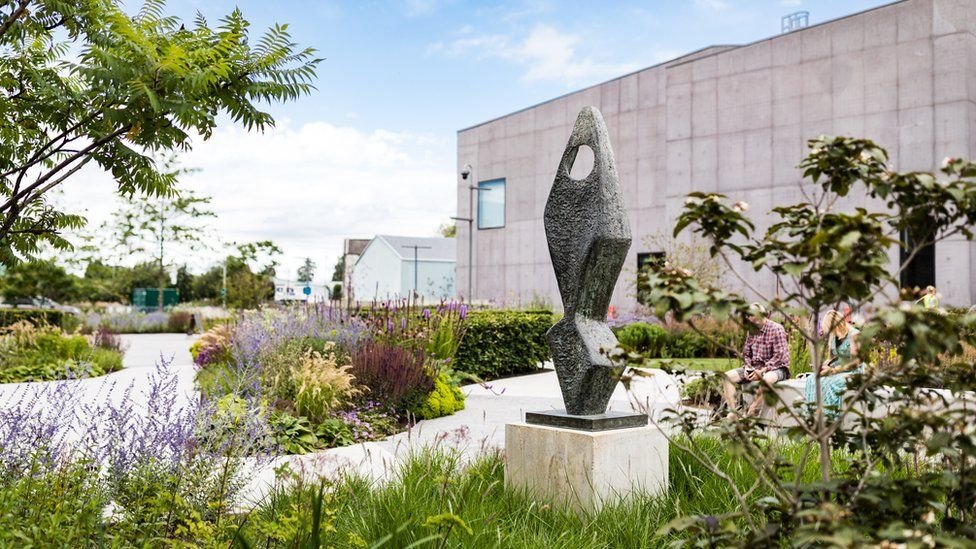
In 2019 the Hepworth Wakefield art gallery started transforming vacant land into a new public garden. Back then it had no idea just how important the finished green space would become for local people during coronavirus lockdowns, when indoor socialising was banned.
"We wanted to nurture not only the ground, the plants, and the ecosystem - but also a feeling of community," explains Katy Merrington, who holds the distinctive title of Cultural Gardener.
She says her work demonstrates to others the value of looking after the environment, as the country gradually gets back to business.
"We've seen with the pandemic that care is the most valuable thing we need. It's something that's not always celebrated. But here, people can see the volunteers and me caring for a garden. And I think that makes them feel a bit cared for too."
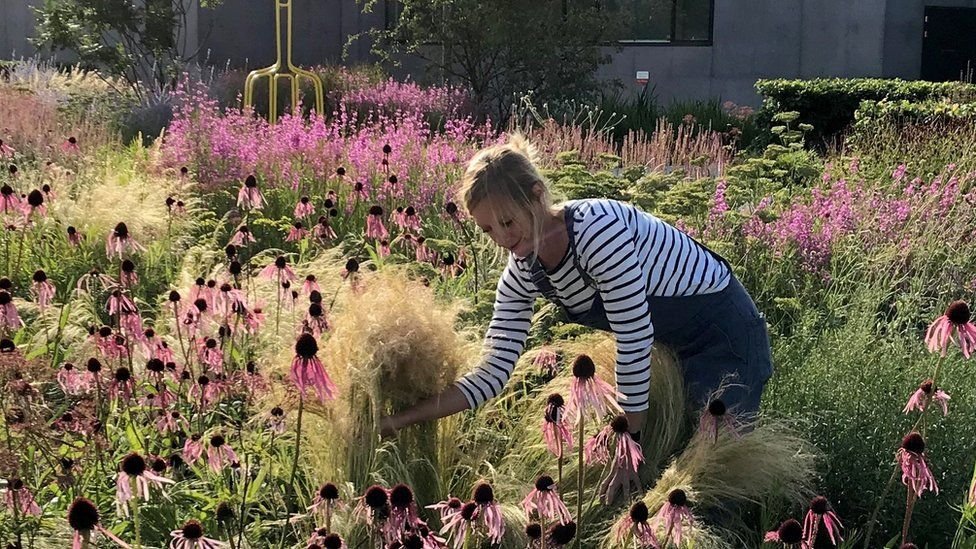
Tate Modern is another gallery encouraging visitors to reconnect with nature this summer. An installation named Beuys' Acorns by the artists Ackroyd & Harvey has seen 100 oak saplings planted on the terrace there.
Two years ago, the Tate galleries declared a climate emergency and pledged to cut their carbon footprint by 10% by 2023. That target has already been reached, says Tate Modern director Francis Morris, adding that the cut should be considered alongside a previous 40% reduction since 2007.
She argues the pandemic helped hasten decisions along. "The system cracked, our budgets were slashed and our activity levels reduced, so we fast-forwarded some of these pretty radical changes."
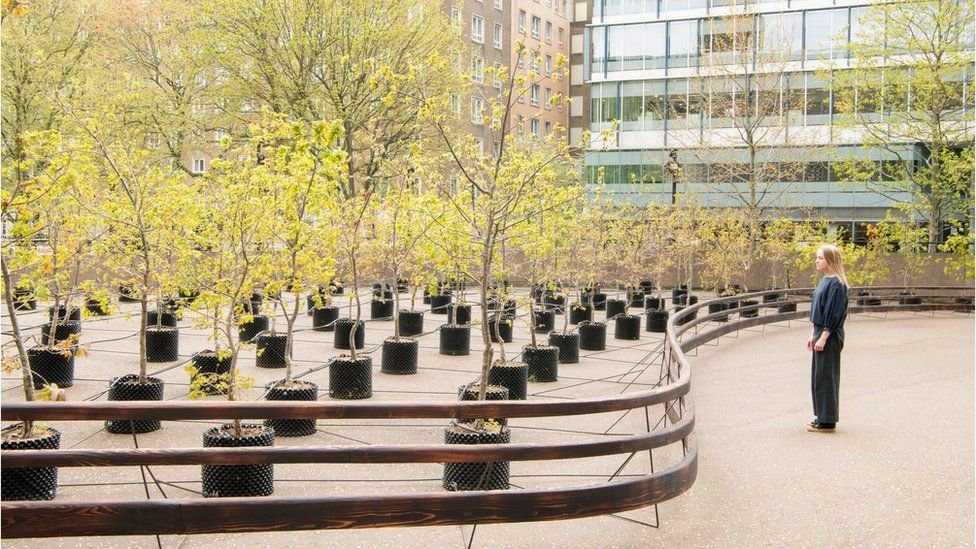
Morris explains that Tate Modern's post-Covid plans include changing between blockbuster exhibitions at a slower speed and doing more to maximise the art it already owns.
"Ideas about reusing, recycling and repairing are so relevant to a permanent collection," she says.
Pedal-powered performances
Top performance venues can be energy-hungry buildings. But the Southbank Centre recently ran an entire production featuring its resident London Sinfonietta orchestra using only cycle power.
The show's soloist, Jessica Aszodi, was among of group of cyclists who pedalled their way through new show Houses Slide, generating electricity for the stage lights and amps.
The pandemic has presented an "incredible opportunity" for climate action, composer Laura Bowler told us beforehand. "People have had to find new ways to create and collaborate."
Her show's carbon footprint was calculated meticulously - even down to the impact of individual Zoom calls. But was this about making a statement, or can others adopt the ideas at play?
"This is a provocation," says Bowler. "At the heart of solving the problems that surround climate change is creativity."
Theatre companies don't get much more creative than the HandleBards. Its actors tour Britain by bicycle, performing Shakespeare using the props they can carry on their backs.
An all-female troupe is back on the road, staging Macbeth in locations from Perth to Preston and Durham to Dorchester.

An electric van carrying a stage is the only automobile involved, explains Tom Dixon, who founded the company with friend Paul Moss to explore how travelling shows can cut their emissions.
"What's exciting is that this is a model that other touring companies could consider," he says.
From punctured tyres to saddle-sore cyclists, Dixon says there can be challenges to keeping such an eco-friendly show on the road. But as live events start up again, he thinks it's theatre's responsibility to encourage ambitious climate action.
"It's one thing to cut your own footprint, but it's another thing to inspire people to cut theirs," he says. "That's where we are in a unique position."
The arts are under close scrutiny on green issues because their work is so public. But is it realistic to expect organisations to prioritise such things after the devastation they've faced from Covid?
Despite the financial challenges, Alison Tickell from Julie's Bicycle remains optimistic. She thinks the pandemic has made people innovate - which will also be helpful for tackling climate change.
"We're seeing such an incredible resurgence of creativity at the moment, not just in this country but everywhere" she says. "That's in response to these huge catastrophic changes."